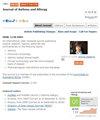草本乙素通过阻断 SGK1/NF-κB 信号通路抑制哮喘的发展
IF 3.7
3区 医学
Q2 ALLERGY
引用次数: 0
摘要
背景:哮喘会引起咳嗽、喘息和肺部炎症,严重影响人们的生活。草本乙炔是一类能抑制炎症发展的天然化合物。然而,草本乙炔是否能抑制哮喘尚未有明确的研究:方法:建立脂多糖(LPS)诱导的肺上皮细胞(BASE-2B)损伤模型,然后检测不同浓度的草本乙素对 BASE-2B 细胞损伤的缓解作用。用细胞计数试剂盒(CCK8)检测草本苷对卵清蛋白(OVA)诱导的哮喘小鼠模型增殖能力的影响,用 Western Blot 和流式细胞术检测草本苷对 OVA 诱导的哮喘小鼠模型细胞凋亡的影响。此外,还通过 HE 和 Masson 染色法检测肺部病理变化,并通过肺泡灌洗液检测血清炎症因子:结果:草本乙炔能降低 LPS 诱导的 BESA-2B 细胞炎症水平和活性氧(ROS)生成,抑制细胞凋亡,促进细胞增殖,OVA 诱导的小鼠肺组织病理学检测 HE 染色、血清炎症因子检测结果相同。Western Blot 显示,草除灵调节 Caspase-3、Bax 和 Bcl-2 的表达。SGK1 过表达会增加细胞凋亡率,而草本乙素能逆转这一现象。通过沉默 SGK1 的表达,发现草本酮是 SGK1 的抑制剂,可以抑制哮喘气道炎症中的 NF-κB/p-P65 通路:结论:草本乙素可通过抑制 SGK1/NF-κB 通路降低促炎细胞因子水平。我们的数据表明,草木犀素对哮喘有显著的抗炎作用,可作为一种潜在的治疗药物。本文章由计算机程序翻译,如有差异,请以英文原文为准。
Herbacetin Inhibits Asthma Development by Blocking the SGK1/NF-κB Signaling Pathway
Background: Asthma severely interferes with people’s lives through coughing, wheezing and inflammation of the lungs. Herbacetin is a class of natural compounds that inhibit the development of inflammation. However, whether Herbacetin inhibits asthma has not been definitively studied.
Methods: Lipopolysaccharides (LPS)-induced lung epithelial (BASE-2B) cells injury model was established, and then the relief of damaged BASE-2B cells with different concentrations of Herbacetin was examined. The cell counting kit (CCK8) was used to detect the effect of Herbacetin on the proliferation ability in ovalbumin (OVA)-induced asthma mice model, and Western Blot and flow cytometry were used to detect the effect of Herbacetin on the apoptosis in OVA-induced asthma mice model. Additionally, pulmonary pathology was detected by HE and Masson staining, and serum inflammatory factors were detected by alveolar lavage fluid.
Results: Herbacetin reduces BESA-2B cells induced by LPS level of inflammation, and reactive oxygen species (ROS) generation, inhibits cell apoptosis, promotes cell proliferation, OVA-induced mice lung histopathology test HE staining, serum inflammatory factors show the same results. Western Blot shows that Herbacetin regulates the expression of Caspase-3, Bax, and Bcl-2. SGK1 overexpression increased the rate of apoptosis, and Herbacetin reversed this phenomenon. By silencing the expression of SGK1, it was found that Herbacetin was an inhibitor of SGK1, which could inhibit the NF-κB/p-P65 pathway in asthmatic airway inflammation.
Conclusion: Herbacetin reduces pro-inflammatory cytokine levels by inhibiting the SGK1/NF-κB pathway. Our data suggest that Herbacetin has a significant anti-inflammatory effect on asthma and can be used as a potential therapeutic agent.
Methods: Lipopolysaccharides (LPS)-induced lung epithelial (BASE-2B) cells injury model was established, and then the relief of damaged BASE-2B cells with different concentrations of Herbacetin was examined. The cell counting kit (CCK8) was used to detect the effect of Herbacetin on the proliferation ability in ovalbumin (OVA)-induced asthma mice model, and Western Blot and flow cytometry were used to detect the effect of Herbacetin on the apoptosis in OVA-induced asthma mice model. Additionally, pulmonary pathology was detected by HE and Masson staining, and serum inflammatory factors were detected by alveolar lavage fluid.
Results: Herbacetin reduces BESA-2B cells induced by LPS level of inflammation, and reactive oxygen species (ROS) generation, inhibits cell apoptosis, promotes cell proliferation, OVA-induced mice lung histopathology test HE staining, serum inflammatory factors show the same results. Western Blot shows that Herbacetin regulates the expression of Caspase-3, Bax, and Bcl-2. SGK1 overexpression increased the rate of apoptosis, and Herbacetin reversed this phenomenon. By silencing the expression of SGK1, it was found that Herbacetin was an inhibitor of SGK1, which could inhibit the NF-κB/p-P65 pathway in asthmatic airway inflammation.
Conclusion: Herbacetin reduces pro-inflammatory cytokine levels by inhibiting the SGK1/NF-κB pathway. Our data suggest that Herbacetin has a significant anti-inflammatory effect on asthma and can be used as a potential therapeutic agent.
求助全文
通过发布文献求助,成功后即可免费获取论文全文。
去求助
来源期刊

Journal of Asthma and Allergy
Medicine-Immunology and Allergy
CiteScore
5.30
自引率
6.20%
发文量
185
审稿时长
16 weeks
期刊介绍:
An international, peer-reviewed journal publishing original research, reports, editorials and commentaries on the following topics: Asthma; Pulmonary physiology; Asthma related clinical health; Clinical immunology and the immunological basis of disease; Pharmacological interventions and new therapies.
Although the main focus of the journal will be to publish research and clinical results in humans, preclinical, animal and in vitro studies will be published where they shed light on disease processes and potential new therapies.
 求助内容:
求助内容: 应助结果提醒方式:
应助结果提醒方式:


